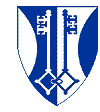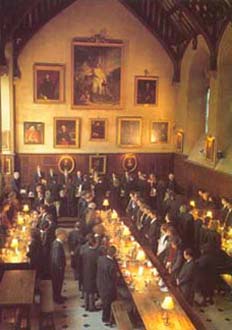
Summer Workshops for Experienced IB Teachers
Course Dinner at Exeter College

|
T:+44 1865 741911 |
|
|
|||||||
Prepare for a rare opportunity to dine among Oxford's dreaming spires...Roni Hameiri
and Andrew Brown, Course Coordinators for the Summer Workshops
cordially invite you to attend the Course Dinner at Exeter College.
Times and dates:
The Dining Hall in Exeter College, dating back to 1618, is without doubt one of the most attractive in the University, providing a historic setting for the evening. This is a once-in-a-lifetime evening to remember, and will surely be a highlight of your trip to Oxford. Price for the evening: £40 Download the course dinner reservation form and send it by fax (+44 1865 310002), or email or post to Roni Hameiri and Andrew Brown, Course Coordinators. (To view the form you need the freely available document viewer Adobe Acrobat Reader, version 3.0 or later. To download your free copy from the Web, go to: http://www.adobe.com/products/acrobat/readstep.html)
A Brief History of the CollegeExeter College has occupied a large part of its present site since its foundation in 1314. Its founder, Walter de Stapeldon, was a Devon man who rose from a humble background to become Bishop of Exeter and Treasurer of England under Edward II. One of his main intentions in endowing his new college was to provide an educated clergy for the parishes of his diocese, and, during the first centuries of its existence, Exeter drew its members from the south-western counties, and especially from Devon and Cornwall. In the early seventeenth century, Exeter became one of the leading colleges in the University, with a high reputation as a school for academics and learned men. Numbers expanded, and the present Hall was built in 1618, together with a matching chapel on the opposite side of the quad. The rest of the front quad was completed in stages between 1672 and 1710. Victorian undergraduates who went on to achieve fame include Sir Charles Lyell, the pioneering geologist, J. A. Froude, the historian, and two of the leading pre-Raphaelites, William Morris and Edward Burne-Jones. Important works by Morris and Burne-Jones are on view in the Morris Room and Chapel. Among twentieth-century undergraduates have been J. R. R. Tolkien, who came up in 1911, Lord Fisher, Archbishop of Canterbury (1906), Sir Roger Bannister (1946), Alan Bennett (1954), Philip Pullman (1965), Martin Amis (1968), and Imogen Stubbs. For more information about Exeter College: http://www.exeter.ox.ac.uk/ |
|||||||
